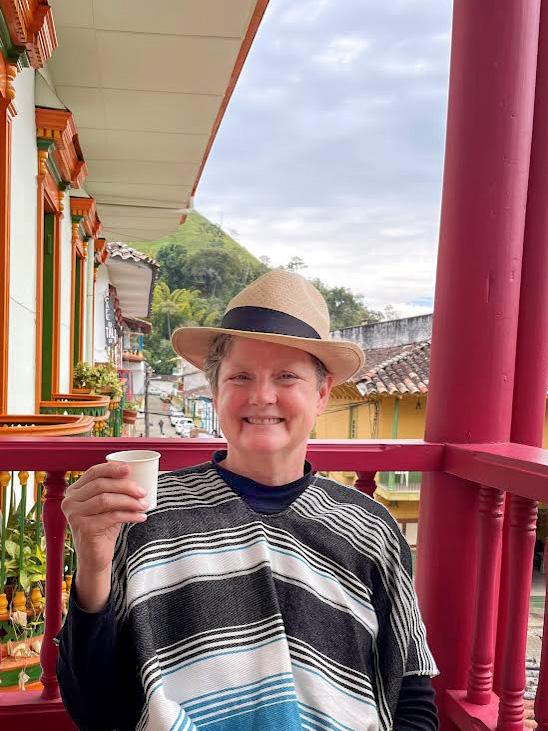Dr. Kristine Muñoz is the Director of the Global Health Studies Program and a Professor of Spanish and Communication Studies at the University of Iowa. She discusses her personal journey through college, her research interests, and what excites her about the Global Health Studies Program.
Getting to Know Dr. Kristine Muñoz
Degrees earned: B.A., B.S., M.A., Ph.D. Communication Studies; B.A. Spanish
Hometown: Dickinson, Texas (near Houston)
Previous jobs: Worked as an astronaut recruiter for NASA in summer after high school; taught ESL between M.A. and Ph.D.
Hobbies: Knitting, swimming, cooking, avid reader of fiction and nonfiction
Family and Pets: Husband Jairo from Bogotá, Colombia; children Gabe (wife Giselle from Honduras), Erica (husband David from Iowa City), grandchildren Liliana (2 ½ years) and Luis (2 months); toy poodle, Lulo (18 months)
Q&A
Why did you decide to enter your field?
I studied abroad in Spain my junior year in college and fell in love with all of it: Spanish, cultural differences, the independent study project that turned into the equivalent of a senior thesis and led me to graduate school. I never wanted to stop going to Spanish speaking countries, asking people questions about their language, hearing stories about their lives, so that’s what I still do!

What were you like when you were in college?
I went from being a bored troublemaker in high school to being in love with learning almost the day I set foot on University of Texas at Austin. Some kids from small towns have trouble with huge, impersonal campus life; it was a dream come true for me. Every day was a new, interesting challenge and I could figure out who I was instead of being “Mr. Fitch’s little girl” (my dad was a junior high math teacher and everyone knew him) or my older brother’s little sister. My favorite class was called The American Experience and it was a combination of English, Government (now called Political Science) and History, a 9-hour course with 732 students enrolled. I will always remember that number because it was 100 more than the total in my graduating class from high school. We read Huckleberry Finn for the historical context as well as the literary importance and the political insight on the Civil War. I got an A on the paper I wrote and said: “That’s it, I’m never leaving.” And here I am, almost 50 years later.
What's your favorite part about being a professor?
That’s easy! Working with the students. In classes where things go just right there comes a time in the semester when the class and I become colleagues, working together on something we’re all interested in, and it’s totally magic. It’s a thrill when we get to that point, and I feel all over again: I’M NEVER LEAVING!
What’s your favorite thing about the Global Health Studies Program?
The flexibility and breadth of courses available, across so many departments and disciplines. So many students with any interest in health issues can find a home here, even if they aren’t sure what part of health they want to concentrate on. And the combination of a BA and a BS in one program is amazing!
What would you say to a student considering the Global Health Studies Program?
Health issues are a huge field for growth, whether you want to be an actual health professional—doctor, nurse, physical therapist, scientist—or a humanitarian, journalist or activist. Global Health Studies offers a broad introduction and a lot of specific ways to follow your passions, whether those are medical, social science, or humanities.
"So many students with any interest in health issues can find a home here, even if they aren’t sure what part of health they want to concentrate on....Global Health Studies offers a broad introduction and a lot of specific ways to follow your passions, whether those are medical, social science, or humanities."
Any current projects in the works?
I’m in the first year of a three-year NEH grant that will build a web-based Health Story Hub, a resource for people who want to incorporate health narratives into teaching, community building and creative work. Launch expected early spring 2023. I’m also part of a research team based in Medellín that’s studying peace education in Colombia after the Havana Peace Accords. I’ll present that work at a conference in Germany next summer in an essay called “Lessons in Peace from a Culture of Violence: Colombia after Havana.”